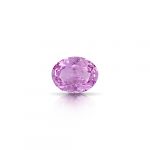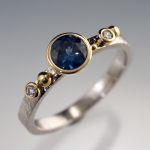
Three rings set with fair trade rubies from Malawi. Photo courtesy Trios Studio, Lake Oswego, Oregon.
Nothing says romance like gemstones. But the gemstone story is not always a pretty one. At the mining and manufacturing end there is environmental degradation, child labor, death from silicosis, low wages, dangerous working conditions. For wholesalers, retailers, and consumers, an uncontrolled supply chain can allow treated, adulterated, imitation, and synthetic materials to masquerade as naturals, creating distrust among buyers and lawsuits against suppliers.
The good news is that millions of “Millennials,” those socially and environmentally aware consumers born in the final decades of the 20th century, are having a tremendous impact on consumerism by demanding that same level of ethical commitment from retailers. Even though many Millennials have not reached their strongest buying years, they’re already willing to pay a premium for responsibly sourced—often called “fair trade”–products, such as coffee, chocolate, and beauty products.

Pink 1.16 ct. sapphire. Photo courtesy Crown Gems.

Montana green sapphire. Photo courtesy Nodeform.
Responsibly sourced gemstones can also meet the ethical standards of anyone concerned about environmental and social issues, and return to gemstones, such as ruby, the romance they deserve.
Essentially, fair trade means fair wages and treatment for miners and cutters; enforcement of health and safety standards; protecting and/or reducing the impact of mining on the environment; controlling the integrity of the supply chain to prevent fraud and deceptive practices; and giving back to the communities in which mining and cutting take place in the form of help with improved education, health care delivery and sanitation, infrastructure, and job training. (Fair trade is not the same as “conflict free.”)

Washing Pit, Sri Lanka. Photo courtesy Crown Gems.
It’s a tall order to change an entire industry, but gemstone wholesalers and retailers are doing what they can in a variety of ways.
Columbia Gem House, one of the first to promote responsibly sourced colored stones, partners with the Chimwadzulu Nyala ruby mine in Malawi. All rough goes to a top-quality cutting house in China that shares their ethical values. By paying above average wages, CGH decreases turnover, and raises worker skill levels over time and, as a result, the quality of the final product. To give back to the producing communities, CGH participates in projects in nearby Ntcheu, Malawi, that raise the quality of services there.

Well, partially funded by Columbia Gem House, Ntcheu Malawi.
Crown Gems, a British-Sri Lankan joint venture, provides a transparent gemstone channel from their own mines in Sri Lanka, or those they trust to use mining practices with less detrimental effect on the environment. They partner with, and oversee the work of small, independent cutters, ensuring that quality cutting is done in safe, well-maintained environments.
Ethical Jewellery Australia Pty Ltd, offers only Australian and Canadian diamonds to their retail domestic market. They buy colored gemstones only from artisanal Australian gem miners and cutters, or suppliers who have strict, transparent guidelines for sourcing and processing.

Fair trade sapphire and diamond ring. Courtesy Trios Studio, Lake Oswego, Oregon.
Owners of the US-based Trios Studio, in Oregon, educate their clients year round about fair trade gemstones. However, a special, in-store event once a year spotlights the stones and draws enthusiastic customers who appreciate knowing a percentage of the proceeds goes to support community projects in Ntcheu, Malawi. They’ve developed such a name that customer seek them out via the Internet.
The interest in responsibly sourced gemstones extends beyond the mine into the laboratory, making lab-created gems–Moissonite, sapphire, emerald, and ruby—a viable option for consumers, too. Designers, such as Konstanze, of Nodeform, and Tamara McFarland, of McFarland Designs, offer consumers the option of buying lab-created gems even for that time-hallowed purchase, the engagement ring.

Sapphire and diamond ring. Photo courtesy Nodeform.
Romance and responsibility. A match made in heaven.
